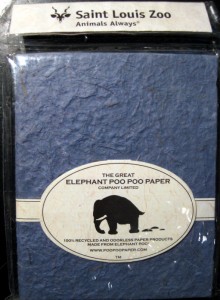I’m getting really tired of greenwashing, so much so that I’ve creating a new category called “greenwashing” dedicated to these sorts of incidents:
A false or misleading picture of environmental friendliness used to conceal or obscure damaging activities. 
Today I am featuring Exhibit A, “Elephant Poo Poo Paper.” It’s being featured here as Exhibit A not because it is the worst offender ever, but because it is my first of a series of incidents of greenwashing I’ll be pointing out over the months. It’s worth our while to point out greenwashing because these sorts of products help maintain the illusion that we don’t need to change our lives dramatically to accommodate Earth’s depleted and contaminated resources. All we need to do is to buy cute products and claim that we thereby give a damn.
Now, back to today’s featured product: “Elephant Poo Poo Paper,” which was recently purchased at the St. Louis Zoo. Just think: we can now make good use of elephant poop (as though it can’t just be left alone to enrich the soil). We can help save the planet by manufacturing heavily-dyed paper and shipping it thousands of miles away from the “elephant conservation parks” where the elephant poo is purportedly gathered and then turned into paper by mixing it with bananas and pineapples.
Buy “Elephant Poo Poo Paper” and feel like you are doing your part to save the world. Better yet, give it as a gift so you can loudly broadcast to others that you are doing your part to save the world.
If it’s actually so good to the earth to make paper out of poop, there is a lot of cow poop (among other kinds of poop) just waiting for those who want to be “green” paper manufacturers.


I have a friend who is extremely vocal about being green, to the point of rudeness. She admonishes us when we use plastic bags instead of re-usable bags. Or when we buy paper plates or disposable water bottles she has a prepared lecture which she Must deliver.
I (smartass) pointed out that she might consider taking the stairs instead of the elevator as that would save as much energy as 10 plastic bags (just a random guess).
It is hard to sort through the deluge of green.
The real question remains: What does "green" mean? Is it all about C02 emissions, or is it still about landfill space? Or is it just about doing what you can as an individual? Or is it a measurement of total energy required vs. energy used vs energy wasted?
Ben:
Generally, being "green" is about reducing one's impact on the environment. I recently wrote about "No Impact Man," who pushed the envelope about as far as one can while living in the middle of a big city. http://dangerousintersection.org/2010/01/10/walki…
To the extent that "going green" has become trendy and sexy, purchasing green products has become just another way of using consumption as a tertiary sex characteristic. It projects: look at me, I am wealthy enough to buy high-end green products, I am nurturing and caring, and I am on top of the latest social movements. Approach me; reproduce with me. Meanwhile, the truly environmentally devoted are busy composting, wearing clothes from Freecycle and the Salvation Army, and not using aluminum-heavy deodorants, and are subsequently having a harder time reproducing.
Another problem: since ethical "green" behavior is now ensconced in liberal morality, anyone who voices skepticism of green products is perceived as a heartless conservative. A great deal of money is being thrown away (along with other resources) in the name of conspicuous 'green' consumption.
I wish there was a way to measure which activities are more beneficial, and which ones are mostly for show.
Maybe a points system or something would be help. For example:
Riding a bike instead of driving would be worth 35 Green points.
Foregoing aluminum heavy deodorant would be worth about 1 green point.
Composting worth 2 points.
Donating to Salvation army 0 points. (benefits offset by environmental costs of transporting and operations)
Letting grass grow longer before mowing, worth 75 Green points.
Taking stairs instead of elevator 20 green points.
Not stopping (car) completely at each stop sign, 60 green points.
Ben: I like your idea. Green versus not-green is not helpful. A government-defined SCALE of green-ness would be much more informative, if done accurately. But there would be immense political pressures to warp the scale. And, of course, as soon as we had a scale, and assuming that merchants self-rated, it would be abused by the merchants. But that could be corrected somewhat by giving consumers the right to sue for flagrant lies.
Greenness Index (Logarithmic Scale)
1 Removing unused icons from windows desktop
1-2 Using only one chopstick instead of 2
2-3 Recycled Chewing Gum
3-4 Using Tivo to skip commercials
5 Turducken